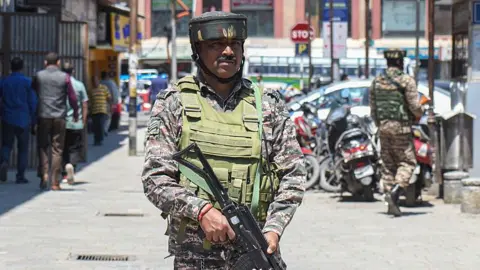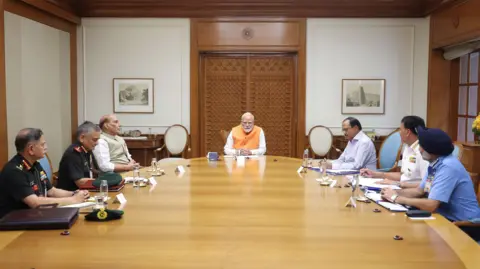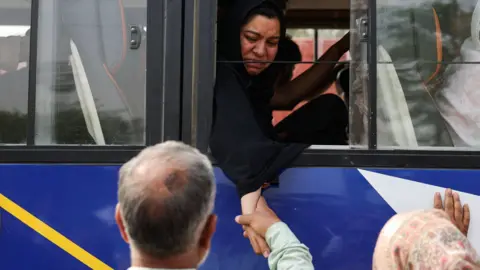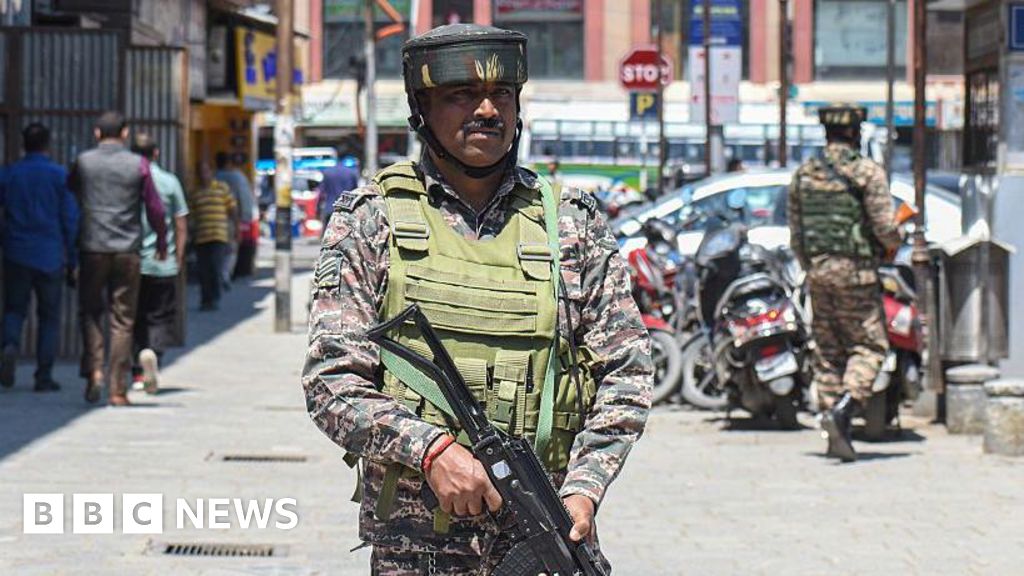BBC News, Delhi
 Getty Images
Getty ImagesThe US has urged India and Pakistan to work together to “de-escalate tensions” after a deadly militant attack in Indian-administered Kashmir last week killed 26 civilians.
Secretary of State Marco Rubio held separate talks with India’s foreign minister and Pakistan’s prime minister on Wednesday and called on them to “maintain peace and security in South Asia”.
India accuses Pakistan of supporting militants behind the 22 April attack at a scenic meadow near the resort town of Pahalgam. Islamabad rejects the allegations.
On Wednesday India also announced the closure of its airspace for all Pakistani aircraft, in the latest of a series of tit-for-tat measures taken by both sides.
The “perpetrators, backers and planners” of the Pahalgam attack “must be brought to justice”, Indian Foreign Minister S Jaishankar wrote on X after speaking to his US counterpart by telephone, as Rubio expressed his sorrow and reaffirmed Washington’s support in India’s fight against terrorism.
Meanwhile, the top US diplomat expressed the need to “condemn the terror attack” in his talks with Pakistani Prime Minister Shehbaz Sharif.
He urged Islamabad to co-operate “in investigating this unconscionable attack”.
During the call, Sharif rejected “Indian attempts to link Pakistan to the incident”, a statement issued by his office read. The Pakistani prime minister also urged the US to “impress upon India to dial down the rhetoric and act responsibly”.
 Press Information Bureau, India
Press Information Bureau, IndiaThe phone calls come after Pakistan’s information minister warned that they had “credible intelligence” suggesting India might launch military action against the country in the next 24-36 hours. Delhi has not publicly commented on these claims.
There has been speculation over whether India will respond with military strikes against Pakistan, as it did after deadly militant attacks in 2019 and 2016. Islamabad has warned of retaliation in case of military action from India’s side.
Amid mounting tensions Indian Prime Minister Narendra Modi has held back-to-back meetings with senior state and defence officials in Delhi this week.
On Wednesday, India’s cabinet committee on security, led by Modi, met for the second time since the attack.
This came a day after the prime minister, in his meeting with India’s top defence officials, gave the armed forces a free hand to decide on the “timing, targets and mode” in their response to the Pahalgam attack, according to Indian news outlets citing unnamed sources.
Troops from both sides have traded intermittent small-arms fire across the border for the past few days.
On Tuesday India “strongly objected” to multiple ceasefire violations by Pakistan during a weekly call between senior army officials of both countries, Indian news outlets reported.
A day later, India announced that it would not allow any Pakistani aircraft – commercial or military – to fly over its airspace, responding to a similar move by Pakistan.
Last week, India suspended most visas given to Pakistani nationals and asked them to leave the country within days, the deadline for which has since passed. It also suspended a key water-sharing agreement with Pakistan.
Islamabad further retaliated with similar visa cancellations and by suspending a 1972 peace treaty with Delhi.
Since the measures were announced, 786 Pakistani citizens have left India and 1,465 Indians have returned from Pakistan, media reports say.
Meanwhile, the Instagram accounts of a number of Pakistani film actors and celebrities have been blocked in India.
 Reuters
ReutersSearches for some celebrity accounts now come up as unavailable.
“This is because we complied with a legal request to restrict this content,” an Instagram notification reads.
India has not officially commented on why the accounts were taken offline. More than a dozen Pakistani news channels were also banned in India earlier this week for spreading what was described as provocative content, media reports say.
Kashmir, which India and Pakistan claim in full but administer only in part, has been a flashpoint between the two nuclear-armed countries since they were partitioned in 1947.
Indian-administered Kashmir has seen an armed insurgency against Indian rule since 1989, with militants targeting security forces and civilians alike.
India has not officially named any organisation it suspects carried out the attack, but it was initially reported that a group called the Resistance Front was behind the attack. The group, however, denied involvement in a statement issued days later. It is reportedly affiliated with Lashkar-e-Taiba, a Pakistan-based militant group, which India classifies as terrorist.
Indian police have named three of four suspected attackers. They said two were Pakistani nationals and one a local man from Indian-administered Kashmir. There is no information on the fourth man.
Many survivors said the gunmen specifically targeted Hindu men.
The attack, the deadliest attack on civilians in two decades in the disputed territory, has sparked widespread anger across India.
Modi has vowed to exact revenge against the perpetrators.
“India will identify, track and punish” the people behind the attack in a way “beyond their imagination”, Modi said in a fiery speech days after the killings last week.
Follow BBC News India on Instagram, YouTube, Twitter and Facebook.

